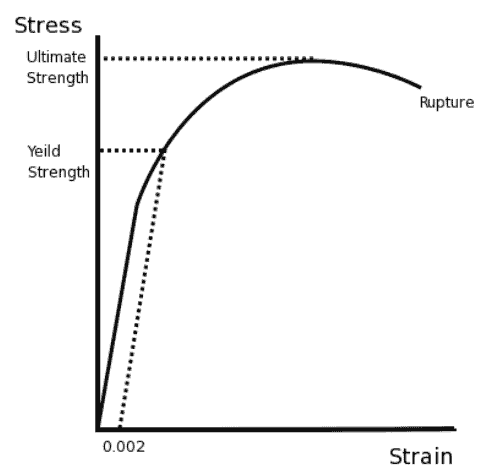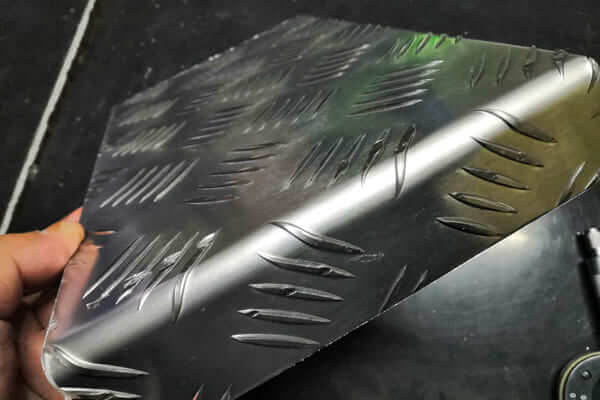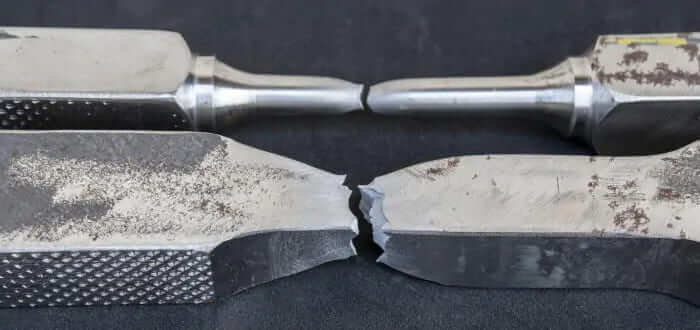A simplified definition of a fabric’s power is its potential to withstand a positive quantity of load, also known as force or strain, earlier than it reaches specific factors of deformation or strain. A normal way of visualizing this is by the well-known stress-strain curve, proven in the example under.

Stress strain graph aluminum
Those curves are commonly made by means of using a sample of material, which includes aluminum, and making use of tensile pressure to motive deformation up till the factor of rupture. The pressure, and consequently the power of the fabric, is typically measured in gadgets of megapascals (এমপিএ) or kilopounds consistent with square inch (ksi). Deformation is measured as a percent of the authentic length of the sample.
The strength of metallic materials can be measured by several indicators:
প্রসার্য শক্তি: The maximum force or pressure that a metal material can withstand under tensile stress. Tensile strength is usually expressed in megapascals (এমপিএ).
উত্পাদন শক্তি: The point at which a metallic material begins to plastically deform or flow under tensile stress. It is the ability of a metal material to resist deformation. Yield strength is usually expressed in megapascals (এমপিএ).
প্রসার: The degree to which a metal material undergoes plastic deformation during stretching. It expresses the percentage by which a material is able to elongate before breaking.
ফাটল বলিষ্ঠতা: The ability of a metal material to resist fracture. It is the ability of a material to resist fracture when subjected to stress concentrations.

Aluminum bending test
These indicators reflect the strength and deformation ability of metal materials when they are subjected to external forces. Different metal materials have different strength properties, so when selecting and designing a metal structure or part, the strength of the material needs to be considered to ensure it meets the intended application needs.
The strength of materials can be measured by several common test methods:
Tensile Test: This is one of the most commonly used testing methods to measure the performance of materials under tensile stress. In the tensile test, the standard sample is stretched, and the stress and strain of the sample are measured at the same time, so as to determine the tensile strength, ফলন শক্তি, প্রসারিত, ইত্যাদি. of the material.
Compression Test: This test method is used to measure the performance of materials under compressive stress. The specimen is compressed while stress and strain are measured to determine the material’s compressive strength and ability to deform.
Bending Test: This test method is used to evaluate the performance of materials under bending loading. The specimen is bent to apply force to measure bending stress and strain and to determine the bending strength and toughness of the material.
Hardness Test: Hardness testing is a quick way to assess the strength of a material. Commonly used hardness testing methods include Brinell Hardness, Rockwell Hardness and Vickers Hardness.
Impact Test: Impact testing is used to evaluate the strength and toughness of materials under impact loads. Commonly used impact test methods include Charpy Test and Izod Test.

Metal after stress strain test
These test methods can provide quantitative data on properties such as strength, deformability, and toughness of materials. Depending on the application needs, it is very important to choose the appropriate test method to evaluate the strength of the material. একই সময়ে, attention should also be paid to factors such as test conditions, standard specifications, and sample preparation to ensure the accuracy and comparability of test results.
Aluminum alloy materials can be divided into low-strength aluminum alloys, medium-strength aluminum alloys and high-strength aluminum alloys according to their strength;
The strength classification is not a strict dividing line, and different aluminum alloy materials can overlap within the strength range. উপরন্তু, the specific composition and heat treatment process of aluminum alloy will also affect its strength characteristics;
The strength of different grades of aluminum alloys is different. উদাহরণস্বরূপ, এর শক্তি 3004 aluminum alloy is much higher than that of 1050, 1060, 1100 and other alloys;
The strength of aluminum alloys of the same grade is also different under different heat treatment states
| শক্তি | 3004-ও | 3004-এইচ | 3004-টি |
| প্রসার্য শক্তি | 125-165 এমপিএ | 165-215 এমপিএ | 165-205 এমপিএ |
| উত্পাদন শক্তি | 100-140 এমপিএ | 145-190 এমপিএ | 145-180 এমপিএ |
| প্রসার | 15%-25% | 5%-15% | 10%-20% |
| কঠোরতা | 30-45 এইচবি | 50-65 এইচবি | 45-55 এইচবি |
Some aluminum alloys have high strength, even comparable to steel. Comparing the strongest aluminum alloy with the same size as steel, steel is generally the strongest.
একটি উদাহরণ হিসাবে, the most tensile energy of one of the normally-determined most powerful aluminum alloys, the AA7068-T6, and one of the strongest metallic alloys, the AISI 1080, are 710MPa and 965MPa, respectively. Here you may see a contrast in their Yield energy and remaining Tensile strength.
| Materials | উত্পাদন শক্তি | Maximum Tensile Strength |
| AA 7068-T6 Aluminum Alloy | 683এমপিএ | 710এমপিএ |
| AISI 1080 ইস্পাত | 585এমপিএ | 965এমপিএ |
When it comes to strength-to-weight ratios, aluminum wins out because it’s only 1/3 the weight of steel with little difference in strength, and it wins when it comes to performance.
When choosing materials, strength is not the only measure, but the strength-to-weight ratio can highlight the performance of materials.
| অ্যালুমিনিয়াম খাদ | Maximum Tensile Strength | প্রয়োগ |
| 2024 | 465এমপিএ | High-strength structural applications, aircraft fittings, ক্ষেপণাস্ত্র অংশ, পিস্টন. |
| 5052 | 228এমপিএ | চাপ জাহাজ, ট্যাংক, architectural uses, স্বয়ংচালিত অংশ, রেলগাড়ির গাড়ি. |
| 6061 | 310এমপিএ | Truck components, পাইপলাইন, recreation vehicles, বিমান, স্বয়ংচালিত অংশ. |
| 7075 | 572এমপিএ | Highly-stressed structural and aircraft parts, machine parts, ordnance. |

Aluminum alloys for aircraft
সাধারণভাবে, অ্যালুমিনিয়াম শীট যা 6 মিমি থেকে পুরু (0.25 ইঞ্চি) পুরু বলে মনে করা হয়.
6061 অ্যালুমিনিয়াম শীট হল একটি আল-সি-এমজি মিশ্র ধাতু যা বৃষ্টিপাত শক্ত হয়ে শক্তিশালী হয়েছে. 6061 অ্যালুমিনিয়াম একটি উচ্চ শক্তি থেকে ওজন অনুপাত আছে, উপরে-গড় জারা প্রতিরোধের, ভাল machinability, এবং ঢালাই জন্য ভাল উপযুক্ত.
3004 অ্যালুমিনিয়াম বৃত্ত ,এছাড়াও নামকরণ করা হয়েছে 3004 অ্যালুমিনিয়াম ডিস্ক,3004 অ্যালুমিনিয়াম ডিস্ক, এটা স্ট্যাম্পিং দ্বারা তৈরি করা হয় 3004 অ্যালুমিনিয়াম কয়েল.
ট্রান্সফরমারের জন্য অ্যালুমিনিয়াম স্ট্রিপ মানে হল যে অ্যালুমিনিয়াম স্ট্রিপ ড্রাই-টাইপ ট্রান্সফরমার এবং তেল-নিমজ্জিত ট্রান্সফরমারগুলির উচ্চ এবং নিম্ন ভোল্টেজ উইন্ডিংগুলিতে পরিবাহী উপাদান হিসাবে ব্যবহৃত হয়।.
5086 অ্যালুমিনিয়াম শীট একটি উচ্চ শক্তি, জারা-প্রতিরোধী আল-এমজি খাদ, মহাকাশে ব্যাপকভাবে ব্যবহৃত, পরিবহন, স্থাপত্য সজ্জা এবং অন্যান্য ক্ষেত্র.
একই রকম 1050 অ্যালুমিনিয়াম শীট, 1060 অ্যালুমিনিয়াম শীট এছাড়াও অন্তর্গত 1 সিরিজ বিশুদ্ধ অ্যালুমিনিয়াম শীট,সাধারণত লিথিয়াম ব্যাটারি নরম সংযোগে ব্যবহৃত হয়, বাস বার, রাস্তার সংকেত, চার্জিং গাদা, অ্যালুমিনিয়াম গ্যাসকেট, বিলবোর্ড বিল্ডিং বহি প্রাচীর প্রসাধন,এবং তাই.
নং 52, ডংমিং রোড, ঝেংঝো, হেনান, চীন
হেনান হুয়াওয়ে অ্যালুমিনিয়াম কো., লিমিটেড, চীন হেনানের বৃহত্তম অ্যালুমিনিয়াম সরবরাহকারীর মধ্যে একটি,আমরা 2001 সালে প্রতিষ্ঠিত, এবং আমাদের আমদানি ও রপ্তানি এবং উচ্চ মানের অ্যালুমিনিয়াম পণ্যগুলিতে সমৃদ্ধ অভিজ্ঞতা রয়েছে
সোম-শনি, 8AM - 5PM
রবিবার: বন্ধ
© কপিরাইট © 2023 হেনান হুয়াওয়ে অ্যালুমিনিয়াম কো., লিমিটেড
সর্বশেষ মন্তব্য
জনাব, Please offer your best FOB Prices specs are as under ALUMINIUM STRIP (AL=99.50% মিনিট) SIZE:450 X32 X6 MM. আপনার এক 570 EN-AW 1050 ক, পরিমাণ = 3400 কেজি
হ্যালো, আপনি নিম্নলিখিত হিসাবে আইটেম অফার তাই দয়ালু হবে: কয়েল 0,6х1250 (1000)mm EN AW-3105 5tons
হ্যালো, আপনি আমাকে অ্যালুমিনিয়াম প্লেট দিতে পারেন?? আসলে আমার দরকার: 110মিমি x 1700 মিমি x 1700 মিমি 5083 H111 - 21 pcs Next year planed is 177 পিসি
মহান নিবন্ধ. আমি প্রসন্ন ছিলাম, যে আমি এই নিবন্ধটি খুঁজে পেয়েছি. অনেকেই তাই মনে করেন, যে তারা এই বিষয়ে নির্ভরযোগ্য জ্ঞান আছে, কিন্তু এই প্রায়ই ক্ষেত্রে হয় না. তাই আমার আনন্দদায়ক বিস্ময়. আমি অভিভূত. আমি অবশ্যই এই জায়গাটি সুপারিশ করব এবং আরও প্রায়ই ফিরে আসব, নতুন জিনিস দেখতে.
অ্যালুমিনিয়াম ফালা প্রয়োজন